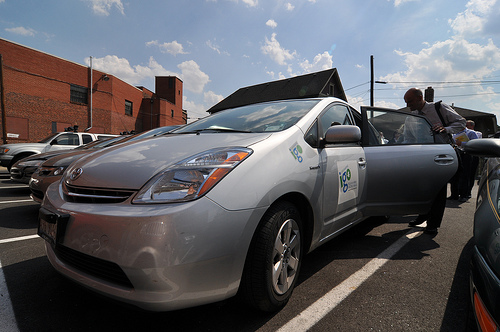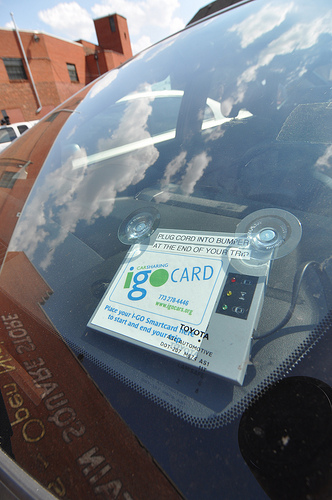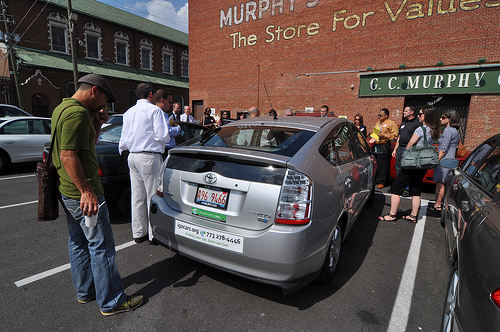
Urban Indy was invited to People for Urban Progress’ studio at the Murphy Building in Fountain Square on Thursday for a car sharing forum. P.U.P. brought in IGO Chicago to consult on a model that would be a good fit for Indianapolis and it’s smaller market type of environment. IGO currently operates the service for the Chicago region with over 200 cars in their fleet.
If you have never heard of a car share, or been a member, like myself, then here is a little background. Cars are stored in areas or “pods” in a predetermined area by IGO. You sign up to become a member and card much like one you would use as a monthly pass on a bus is issued to you. An online reservation page is setup to show available cars in the locations where cars are kept. You can reserve the car on a certain day for a certain amount of time. When you show up at the car, there is a box under the windshield that picks up on the card that was issued. It reads your membership information and looks you up in the database to make sure you are scheduled to pick up this car. The door unlocks, you get in and the keys are contained within a compartment inside. That is pretty much it. There is a seperate card in the car should the gas tank need refilled. IGO also has two electric cars that they task members with plugging back in when they return the car.

Just as it sounds, this may be a difficult service for commuters to use. You would also be correct. The service is setup to compliment a transit system that caters to people who choose to live or who’s lifestyle dictates a low car needy-ness if you will. One could say, in transit terms, that this is one of many “last mile” types of solutions. In Chicago, where there are over 200 cars, it is not so unreasonable to think that this could be an easy to plan for solution. IGO reported that the majority of their trips are people who need to travel to the grocery but cannot carry all their needs back on a bus or train. Business and government are also clients. The City of Chicago reportedly reduced their vehicle fleet by 600 cars and implimented usage of IGO as a way to get city employees around to meetings or other tasks. IGO Chicago has been reasonably successful in implimenting their service in Chicago and also have an agreement in place with CTA (Chicago Transit Authority) to be able to use a CTA card with IGO cars, and vice versa. An IGO member can charge up their card with CTA transit fares to use the bus and L trains around the city making transfer from one service to the other, simple and seemless. A service in Indianapolis could conceivably interface with IndyGO in the same fashion.
Notable attendees for the forum included Roscoe Brown of IndyGO, Mike Dearing of the Indianapolis MPO and Sean White of Indyconnect. There were nearly 20 people in attendance representing all manner of concerned parties from environmental, to design and development.

P.U.P. intends to be the local interface for this and plans to apply for a CMAQ (Congestion Mitigation and Air Quality) grant to help get the program off the ground and fund the model much like Chicago with memership and user fees. The MPO’s Mike Dearing was in attendance and seemed on board with the idea. The Q&A session of the forum pointed out that many other cities used CMAQ as a way to fund start up operations until a profit margin was made. Chicago’s service needed a subsidy for the first 3 years but now operates on a low margin of profit yearly to keep services going. To keep up with this program as it develops, keep an eye on P.U.P.s webpage at www.peopleup.org.
People for Urban Progress is an Indianapolis based 501c3 non proft that focuses on advancing and enhancing downtown’s urban quality of life. They stand for project based progress, working on projects that improve and promote public transit, environmental awareness and urban design. They have a record of success in salvaging the vast majority of the fabric from the demolished RCA dome.
Full Disclosure: Your author works closely with P.U.P. in trying to advance transit improvements. I will be attending Railvolution in Portland, OR in October 2010 as a representative of P.U.P.
For those that don’t know, the hourly charge (or quarter-hourly, whatever) includes insurance, gas, etc. This means for $X/hr, you don’t have to worry about insurance and fuel. Pretty good deal for the biker or bus commuter needing the occasional grocery run.
Or a car payment. There was some data in the presentation that suggested that if one gave up a car altogether, that you would save nearly $6000 a year in depreciation, insurance, gas, upkeep, etc.
I am so glad PUP is chasing after this. I don’t have a car and live in DT Indy and can easily see myself using this service regularly. Lets hope something good comes out of this.
Sounds like a great idea for large metropolitan areas that need alternate modes of transportation for a myriad of lifestyles. Good luck to this forward thinking project.